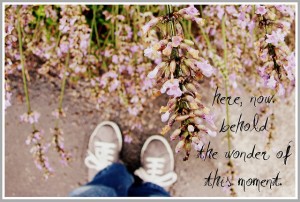
Gratitude*
“Some of it’s magic, some of it’s tragic
But I had a good life all of the way.”
from He Went to Paris by Jimmy Buffett
In the first post in this series regarding dispositions that enhance the lives of gifted elders, we looked at the rich social legacy that many elders choose to leave as a result of their work for the common good in society. The second BE-attitude is being present to gratitude. Over the last few years, my spouse and I remarked often on how fortunate our lives have been – we have a marriage that has endured for close to 43 years in spite of many health and other difficulties, we have two wonderful sons and their families, and we had the opportunity to develop fulfilling careers. Yes, we are grateful. However, do I cultivate the disposition of being truly present to gratitude?
I look forward toward my remaining years, which I calculate to be a maximum of twenty years, and I recognize a desire to experience gratitude with a depth and palpability that can only come from showing up and being present. In other words, rather than just “paying lip service” to gratitude, I want to live in such a way that I exude the gratefulness I feel for all of the gifts – of people, of nature, and of my own development – that I have experienced throughout my life.
As I wrote above, I have at most twenty years remaining in my life. If I spend a mere fifteen minutes a day saying that I am grateful, I have the potential to accumulate about three months of gratitude in those twenty years. If I, however, develop a habit of being continuously present to gratitude, I multiply that time exponentially.
 What is gratitude and what does it mean to be present? Gratitude is defined as a feeling of thankfulness. Mere thankfulness does not explain the depths of feeling many gifted individuals can experience. For me, gratitude is the feeling that overwhelms me when I become aware of the wonder of creation, when I behold the awesomeness of Nature, my spouse, my grandchild, or any number of moments in my day when the beauty of my existence washes over me in continuous, unrelenting waves.
What is gratitude and what does it mean to be present? Gratitude is defined as a feeling of thankfulness. Mere thankfulness does not explain the depths of feeling many gifted individuals can experience. For me, gratitude is the feeling that overwhelms me when I become aware of the wonder of creation, when I behold the awesomeness of Nature, my spouse, my grandchild, or any number of moments in my day when the beauty of my existence washes over me in continuous, unrelenting waves.
As we age, a number of negatives may confront us. Among these are impending death, diminished physical and mental health, limited financial resources, loss of loved ones, and more. It is no surprise then, that so many elders are at risk of developing mood disorders. We learn from research that gratitude is one of the best defenses against mood disorders such as depression, anxiety, and existential angst. Gifted elders perhaps more so that many others, due to their heightened sensitivities, experience both extremes – of sadness and of joy – much more intensely. It is my hope that all our elders have caring family and friends that help them to awaken the presence of gratitude.
What does it mean to be present? It is to be here and to be here now. Currently, more and more baby boomers are entering elderhood having been indoctrinated by a culture of busyness and multitasking. However, the reality is that our brain is not wired to multitask. Rather, we are wired to attend to one stimulus at a time. Thus, being present to gratitude is attending, and attending, and attending, in a succession of moments. I read an article recently by Michael Formica (2011) in which he suggested a number of steps that assist us in being present and, thus, in allowing us to cultivate the be-attitude of being present to gratitude. To paraphrase him, they are:
- Breathing at a slow and deliberate pace, focusing on the out-breath.
- Practicing awareness of the present moment – where you are, what your thoughts are, what you are feeling.
- Being a witness to yourself and what you are doing in the present moment.
- Letting go of whatever is not in the present moment.
- Returning to the breath when something pulls you away from the present moment. Inhale slowly, breathe out, focusing on the out-breath.
By being present and practicing gratitude, it is my belief that gifted elders will find more contentment and pleasure in their lives. I am here. I am here now and I am grateful.
Reference:
Formica, M. J. (2011, June 11). 5 Steps for Being Present. Psychology Today. Retrieved from https://www.psychologytoday.com/blog/enlightened-living/201106/5-steps-being-present
*Photo: Gratitude by Joker the Lurcher on Flikr. (CC BY-ND 2.0)
** Photo: Here, now by Joanna Paterson on Flickr. (CC BY-ND 2.0).
Such a beautiful reminder. Gratitude makes a fulfilling life. Thank you, Joy, for your wisdom!
LikeLike
My gratitude goes out to you, Marianne, for your support and your sharing of your wisdom as well at mariannekuz.wordpress.com . Warm hugs to you!
LikeLike
grateful for this Beautiful sharing! Thank you Joy!
LikeLike
Thank you so much for your comment your gratitude!
LikeLike